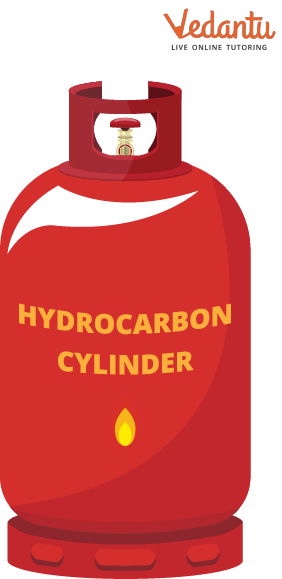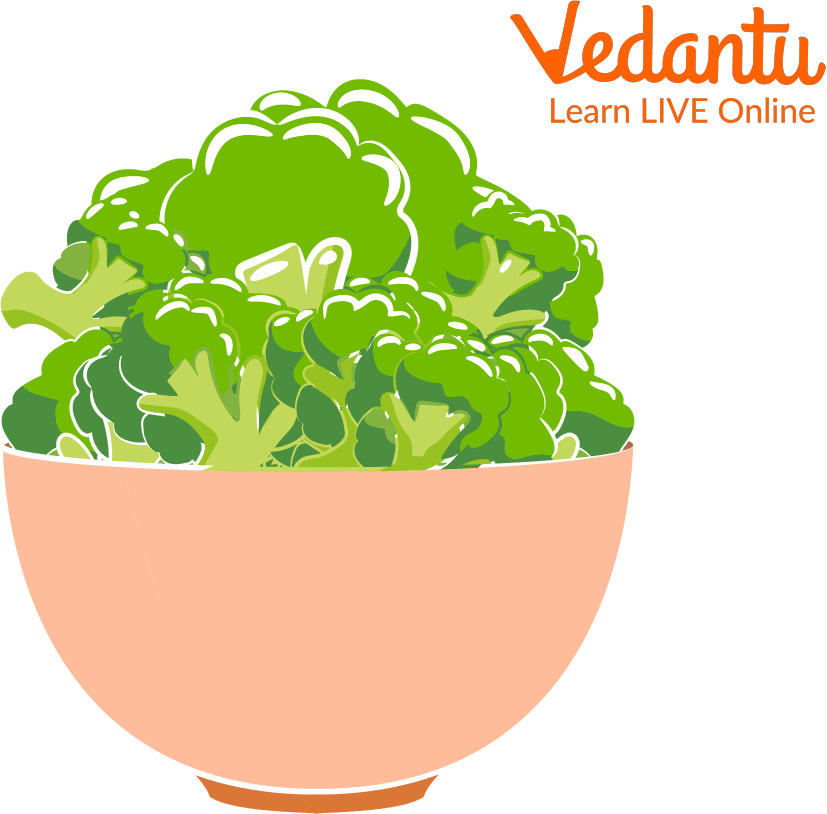




Everyday Applications and Importance of Hydrocarbon Gas
Any of the organic chemical compounds of the hydrocarbon class only include the atoms carbon (C) and hydrogen (H). The hydrogen atoms link to the carbon atoms in various ways to create the compound's basic structure. The main components of petroleum and natural gas are hydrocarbons.

A Hydrocarbon Cylinder
What is a Hydrocarbon Gas?
Natural gas, commonly called hydrocarbon gas, is created in the Earth's crust by breaking organic materials. It is a mixture of several hydrocarbons that melt at various temperatures and condense into liquids.
Hydrocarbons can have various chemical and physical properties depending on the bonding structure of their carbon, hydrogen, and oxygen molecules.
Uses of Hydrocarbon Gas
There are various hydrocarbon gas examples and consists of its different uses:
Methane- is the simplest and most common hydrocarbon gas. It's utilised as a fuel for cooking and heating homes and businesses. Electric power generation and methanol manufacturing are its main industrial uses.
Ethane- Ethane is a two-carbon molecule that ranks second to methane as the primary ingredient of hydrocarbon gas. Ethane serves as the main fuel in the production of common petrochemicals after being separated from methane through a refrigeration process.
Butane- Four carbons make up the butane molecule. Its primary use is as a cooking gas on camping, mixed with propane in jars. Butane is used as a fuel in deodorants and cigarette lighters.
Pentane- This gas has five carbon atoms and is flammable at normal temperatures. Its primary industrial use includes using it as an organic solvent in chemistry labs and as a foaming agent when making plastic.
Hexane- Hexane is a six-carbon molecule mostly used to manufacture glue, fuel, and food processing. Although hexane has a slight numbing effect, it harms the nervous system of humans.
Uses of Hydrocarbons in Everyday Life
Medicines- Aspirin is one of the medicines for headaches that is made up of hydrocarbon. It helps in getting rid of fever, headache and nausea feeling.
Food- Some fruits and vegetables have a wax covering. This is because many food products are coated with paraffin wax, a soft, colourless substance formed of hydrocarbon molecules, to prevent poor consequences during preparation and shipping—for example, brocolli and cauliflower.
Lipstick- Not simply the food and beverage business uses paraffin wax. Additionally, various cosmetic goods, including lipsticks, are produced using it. Moreover, it's an essential factor in scented candles.
False Teeth- False teeth used to be constructed out of materials like wood, ivory, or even actual human teeth centuries ago. However, since then, science has made some progress. False teeth are now constructed of nylon, porcelain, metal, and hydrocarbon.
Solar Panels- Since they supply the energy required to create the components, fossil fuels are essential to producing solar panels. In addition, the panels themselves include hydrocarbons, with synthetic plastic components playing an essential role in solar cells.
Clothing- While some clothes are manufactured entirely of wool or cotton, most clothing sold worldwide has some polyester. Since this hydrocarbon-based fibre cannot be decomposed by nature, it is not as environmentally friendly as other organic options.

Some Broccoli Have Hydrocarbon Covering
Uses of Hydrocarbons in Medicine
In medicine, hydrocarbons create sedatives or sleeping pills like chloral hydrate, inhalers, and painkillers like drugs. Refrigerants include nitrogen and other hydrocarbons.
In medicine, hydrocarbons are used in oil supplementation, vaccines, injections, and tablets.

False Teeth Consisting of Hydrocarbon
Conclusion
In our everyday lives and modern lifestyles, hydrocarbons are used in many ways. It makes a substantial contribution to the medical industry. The majority of petroleum and natural gas is made up of hydrocarbons. They serve as lubricants, fuels, and raw materials for rubber, plastic, fibre, explosives, and industrial chemicals. Some hydrocarbons, however, are harmful to human health.
FAQs on Uses of Hydrocarbon Gas
1. What are hydrocarbon gases and where are they found?
Hydrocarbon gases are organic compounds composed exclusively of hydrogen (H) and carbon (C) atoms, existing in a gaseous state at standard temperature and pressure. They are the primary constituents of natural gas, which is a fossil fuel found in underground reservoirs, often alongside petroleum deposits. The simplest and most abundant hydrocarbon gas is methane (CH₄).
2. What are the main types of hydrocarbons as per the CBSE syllabus?
Based on their carbon-carbon bond structure, hydrocarbons are broadly classified into three main categories:
- Saturated Hydrocarbons (Alkanes): These contain only single bonds between carbon atoms (e.g., methane, ethane). They are called 'saturated' because each carbon atom is bonded to the maximum possible number of hydrogen atoms.
- Unsaturated Hydrocarbons: These contain at least one double (Alkenes) or triple (Alkynes) bond between carbon atoms (e.g., ethene, ethyne).
- Aromatic Hydrocarbons: These are a special class of cyclic compounds containing a benzene ring or other ring systems with similar delocalised electron properties, such as benzene and toluene.
3. What is the key difference between saturated and unsaturated hydrocarbons?
The key difference lies in their chemical bonding and reactivity. Saturated hydrocarbons (alkanes) have only C-C single bonds, making them relatively stable and less reactive. Unsaturated hydrocarbons (alkenes and alkynes) have C=C double or C≡C triple bonds. These multiple bonds are regions of high electron density, making them much more chemically reactive and able to undergo addition reactions.
4. What are some common examples of hydrocarbon gases and their everyday uses?
Several hydrocarbon gases are essential in our daily lives:
- Methane (CH₄): The main component of natural gas, used for cooking (piped gas) and heating homes and generating electricity.
- Ethane (C₂H₆): Used as a petrochemical feedstock to produce ethylene, which is a building block for plastics.
- Propane (C₃H₈): Commonly used as a fuel for heating, cooking (in LPG cylinders), and in vehicles.
- Butane (C₄H₁₀): Used in LPG along with propane, as a fuel in lighters, and as a propellant in aerosol sprays.
5. Why are alkanes, like methane and ethane, considered relatively unreactive?
Alkanes are known as paraffins (from Latin 'parum affinis', meaning 'little affinity') because of their low reactivity. This is due to two main reasons: 1) The C-C and C-H single bonds are very strong sigma (σ) bonds, which require a large amount of energy to break. 2) The bonds are non-polar in nature, so they do not attract polar reagents like acids or bases, making them resistant to many common chemical reactions.
6. How are hydrocarbon gases like propane and butane stored as liquids in cylinders?
Propane and butane are stored as liquids in cylinders through a process of compression and cooling. While they are gases at normal atmospheric pressure, increasing the pressure on them forces their molecules closer together, causing them to condense into a liquid state. This is why they are called Liquefied Petroleum Gas (LPG). Storing them as a liquid allows a much larger amount of fuel to be contained in a portable cylinder compared to storing it as a gas.
7. Are all hydrocarbon gases harmful or dangerous to human health?
The health impact of hydrocarbon gases varies significantly. While short-chain hydrocarbons like methane and ethane are primarily asphyxiants (they can displace oxygen in enclosed spaces), they are not highly toxic. However, prolonged exposure to other hydrocarbons can be harmful. For example, hexane can cause nerve damage, and aromatic hydrocarbons like benzene are known carcinogens, meaning they can cause cancer after long-term exposure. Therefore, proper ventilation and handling are crucial.
8. What is isomerism in hydrocarbons, and why is it an important concept?
Isomerism is a phenomenon where two or more compounds have the same molecular formula but different structural arrangements of atoms. For example, both n-butane and isobutane have the formula C₄H₁₀, but their atoms are connected differently. This is important because isomers have different physical and chemical properties. For instance, n-butane has a higher boiling point than isobutane. This concept is crucial in the petroleum industry for processes like refining gasoline to improve its quality.
9. Beyond being fuels, what role do hydrocarbons play in manufacturing everyday products?
Hydrocarbons are fundamental raw materials (feedstock) in the petrochemical industry. They are not just burned for energy but are transformed into countless products. Key applications include:
- Plastics and Polymers: Ethene (from ethane) is used to make polyethylene, one of the world's most common plastics.
- Synthetic Fibres: Hydrocarbons are the starting point for materials like nylon and polyester used in clothing.
- Solvents: Compounds like hexane are used as industrial solvents for glues and cleaning agents.
- Pharmaceuticals: Many drugs and medicines are synthesised using hydrocarbon derivatives as a base structure.





















